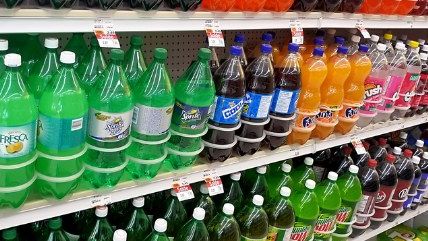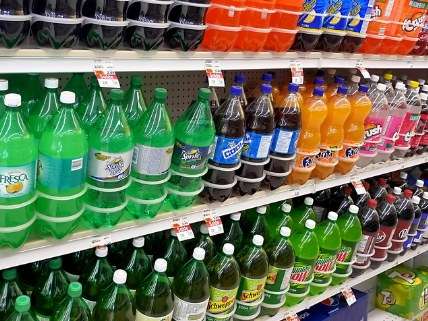Philadelphia's Soda Tax Is a Bad Idea Other Cities Will Copy
Despite promises from activists and lawmakers, it won't help low-income consumers.


Earlier this month, Philadelphia adopted a penny-and-a-half-per-ounce soda tax. The revenue from the tax will be used in large part to expand pre-kindergarten opportunities—a potentially dubious pursuit. A critic might note that spending tens of millions of dollars to expand pre-K in a city where even the most optimistic reports show city schools already fail to educate children and are routinely broke may not be the best idea.
Philadelphia's soda tax isn't the nation's first—that dishonor belongs to Berkeley—and it likely won't be the last. That's because such taxes, once touted as an evidence-free way to reduce obesity, are now seen by cash-strapped cities as a fix-all for their often self-imposed budgetary woes. Soda taxes won't just reduce obesity rates, advocates claim, but also fill city coffers.
Despite the shift from rhetoric about soda taxes as an anti-obesity tool to soda taxes as a revenue-raising mechanism, the public-health crowd, which openly detests soda—New York University Prof. Marion Nestle's book Soda Politics: Taking on Big Soda (and Winning), published last fall, paints the soda industry as "the enemy," while former Bloomberg administration health commissioner Thomas Farley, the brains behind New York City's short-lived soda ban and the current Philadelphia health department head, has called soda "weaponize[d]"—is still on board (and behind) soda taxes.
Farley's old boss, former New York City mayor Michael Bloomberg, for example, a leading opponent of both soda and food freedom, in a statement sent to me and others after Philadelphia's tax became law, said he'll "continue working to ensure that cities and nations pursuing these anti-obesity strategies get the support they need to level the playing field with the soda industry."
Indeed, activists like Bloomberg are also funding efforts to place soda tax initiatives on ballots in a dozen other U.S. cities later this year, including San Francisco, which already voted down a tax. These funding efforts in Philadelphia drew criticism. Philadelphia magazine lamented the influence of "dark money" from Bloomberg and others to bankroll a group supporting the tax.
In addition to activist support, some legal academics also praise soda taxes. Recently, for example, two tax law faculty argued that such taxes aren't regressive if they help pay for things that benefit low-income Americans.
But who do such taxes really benefit—if anyone?
What negative impact will Philadelphia's soda tax have on employment at groceries and convenience stores, and on their suppliers? Won't the soda tax increase alcohol consumption, since six-pack of soda will now cost about the same as a six-pack of beer? Won't higher-income Philadelphians simply drive outside the city (or even the state) to buy soda at places like Costco (meaning the tax burden will likely be borne more by low-income consumers)? What if families pay more for soda and as a result can afford to buy fewer fruits and vegetables?
Consider, too, that there is little or no evidence that soda taxes reduce obesity. Soda accounts for about five percent of the calories Americans consume. Recent research suggests soda taxes may cut that already small consumption rate by about 10 percent. Even if we don't replace soda calories with calories from candy, pizza, beer, or cookies—though research suggests we will—then soda taxes will eliminate 10 calories a day from our diet, or about one pound per year. In other words, soda taxes won't make anyone thinner.
Even absent taxes, reducing soda consumption hasn't dented America's obesity problem. Soda consumption has fallen in the United States by 25 percent since the 1990s. But data suggests Americans are as obese as ever. That means people drank far less soda even as obesity rates continued to rise.
At least one key effort to boost revenue to improve the well being of low-income Americans hasn't worked—and is as regressive as any policy in existence.
"State lotteries were supposed to provide money and resources to public schools and, in turn, to improve educational outcomes," I noted in a Playboy column last year. "But educational achievement has stagnated in recent decades. And lotteries have served as little more than a tax on the low-income Americans who buy the bulk of the tickets."
It's troubling that soda tax supporters are unable to demonstrate that soda taxes may improve health outcomes. Using soda taxes as a tool to fund other policy initiatives that purportedly benefit low-income consumers is also destined to fail when those policies themselves aren't proven to be effective. Policy decisions like these that are driven by a mix of campaign promises (as in Philadelphia) and passion simply invite future food-policy interventions that are set up to fail.
Prof. Nestle has referred to soda as "low-hanging fruit." Who's to say other fruits higher up on the tree branch won't be the next targets for those who want to tax our food? Activists recently seized on a World Health Organization report that links consumption of bacon, beef, and other meats to cancer.
Today's soda tax could turn into sin taxes on hamburgers and bacon. It could evolve into taxes on foods that are high in carbs. If organic food is somehow better than cheaper competitors, governments may choose to tax non-organic foods.
Where, if anywhere, does this stop? Unfortunately, not in Philadelphia.
